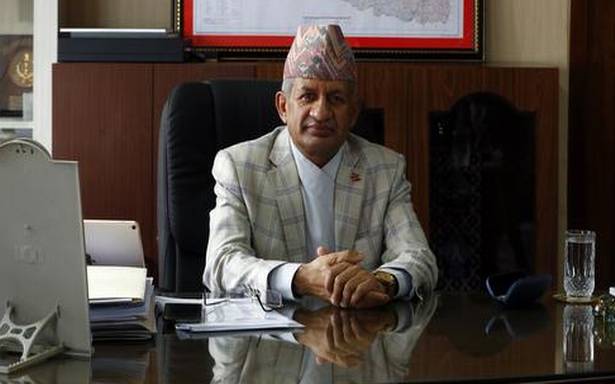Visiting Foreign Minister also took up Nepal’s requirement for vaccines to fight COVID-19
Nepal has raised the Kalapani boundary dispute with India during the Joint Commission meeting, visiting Foreign Minister Pradeep Kumar Gyawali said here on Friday. The Minister said that the Indo-Nepal boundary dispute exists in “two segments” and Kathmandu wishes to find a solution to the matter urgently. Mr. Gyawali took up Nepal’s requirement for vaccines to fight the COVID-19 pandemic as Kathmandu approved Serum Institute of India’s (SII) Covishield vaccine.
“We started the demarcation and mapping of the boundary since 1981. At that time, Joint Technical Committee was founded which had tenure till 2007. It produced 182 strip maps which depicts the border… but for various reasons [work on] two segments — Susta and Kalapani — were not completed. If we talk of the overall boundary between Nepal and India, it is a smaller segment. However, it is an unfinished work and that’s why we are talking of the need and urgency of finalising and finishing those segments as well,” said Minister Gyawali, addressing a gathering at the Indian Council of World Affairs (ICWA).
This is the first time that the Foreign Minister of Nepal has presented the dispute on the boundary front from the Indian capital since the issue erupted in November 2019 prompting Nepal to unveil a new political map that showed the Kalapani-Lipulekh-Limpiyadhura region of Pithoragarh district as part of the country’s sovereign territory. Friday’s observations about the border dispute reveal a slight change in Nepal’s articulation of the dispute as Kathmandu had stated while amending the Constitution to include the Kalapani region in the updated map that its claim is based on the Treaty of Sugauli of 1816.
The Hindu had reported earlier citing informed sources that the Indian side was aware the Nepalese delegation would raise the boundary issue in Friday’s interaction but said that India will not discuss the matter at the Joint Commission level as the boundary dispute has a dedicated Foreign Secretary-level mechanism which is yet to meet. Addressing the bitterness that was witnessed in India-Nepal relations in 2020, Mr. Gyawali said there were “ups and downs” and there were differences on some issues. “But overall partnership and relation moved smoothly and we should take this momentum ahead by drawing lessons from that,” said Mr. Gyawali highlighting that Nepal Prime Minister K.P. Sharma Oli and Indian Prime Minister Narendra Modi shared “very personal” ties.
Mr. Gyawali delivered the speech at the ICWA on “Nepal-India Relations”, which was held after he headed the Nepalese delegation at the Sixth Joint Commission meeting with External Affairs Minister Dr. S. Jaishankar. A statement issued by the Ministry of Foreign Affairs of Nepal said “boundary and border management” was part of the discussion. In contrast, a statement issued by the Ministry of External Affairs said “border management” was part of the discussion. The statement from Nepal said that both the teams “discussed the review of the Peace and Friendship Treaty of 1950”. It is understood that the review has been recommended by the Eminent Persons Group (EPG) constituted by Mr. Modi and Mr. Oli in 2016. The EPG report, which has been completed, is yet to be submitted to the Indian Prime Minister. The Nepalese statement said the issue of “submission” of the report was also raised during the meeting.
Mr. Gyawali, who is accompanied by Laxman Aryal, Secretary of the Ministry of Health and Population of Nepal, took up Kathmandu’s requirement for vaccines made in India. The discussion was held in the backdrop of the MEA’s declaration that the vaccines for other countries will “take some time” as the domestic process of rolling out of the vaccine is just beginning in India. “On Nepal’s request for the Government of India’s support in availing COVID-19 vaccines, the Indian side assured that the requirements of Nepal would be in priority consideration after the roll-out of vaccines,” he said. Hours after the bilateral meeting, Kathmandu cleared SII’s Covishield vaccine.
Both the delegations reviewed the development partnership and discussed the benefit of the Integrated Check Posts (ICP) at Birgunj and Biratnagar. They welcomed the commencement of construction of the third ICP at Nepalgunj. India also informed that a new ICP at Bhairahwa “would be initiated shortly”. India conveyed that it would build two cultural heritage projects in Nepal on the ‘Pashupatinath Riverfront Development’ and the ‘Bhandarkhal Garden Restoration in Patan Durbar’ through grant assistance.
Source: Read Full Article

